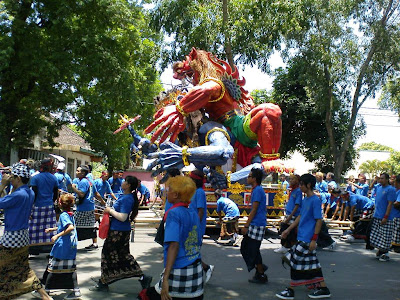AS TOURISTS and non-Hindu residents prepared to leave Bali for the island’s Hindu new year celebration of Nyepi, this year on 23 March, Lombok businesses were planning to welcome them with major festive events or simply with their usual high standards of hospitality.
Bali closes down for 24 hours over the holy Silent Day of Nyepi when residents are confined to their homes and tourists to their resorts. Services are limited, only emergency traffic is allowed and people are required to reject conveniences such as electricity, music and cooking in favour of meditation, fasting and prayer.
Lombok, especially its coastal tourism strip of Senggigi and north-western party island of Gili Trawangan, is an established haven for non-Hindus who traditionally leave the restrictions of Nyepi to the Balinese and journey off-island for fun and frivolity or peaceful relaxation.
Lombok tourism operators were working with Bali-based travel agents to promote their Nyepi events and packages which usually bring in large numbers of arrivals over the two or three days before Bali’s Silent day.
At some resorts, early high bookings for Nyepi in response to special packages without specific festivities had shown that guests wanted normal standards of service and accommodation rather than lively celebrations.
At Gili Trawangan’s star-rated Hotel Villa Ombak, an early 95 percent occupancy rate for Nyepi and a Nyepi Day wedding convinced management not to stage its usual welcome ceremony for tourists from Bali.
“Guests will be well catered for at our buffet dinner on Nyepi night,” said sales manager Ika.
Senggigi’s Hotel Jayakarta and Santosa Villas and Resort also decided to forgo special events. “For this year’s Nyepi, we have a lot of bookings from Bali travel agents for accommodation and dinners in response to our Nyepi packages,” said marketing officer Nunik.
At Santosa, where Nyepi occupancy had reached 90 percent due to several meetings and conventions bookings, there was no need for events.
“The hotel remains open to guests making their own bookings and to those who want to hold buffet events,” said sales manager Doris.
Along the bustling Senggigi tourism strip of Jalan Raya Senggigi, bars, restaurants, cafes and pubs stage nightly entertainment that is sure to relieve Nyepi refugees of any thoughts of the imposed quiet and inactivity on Bali.
At Mataram, only 15 minutes from Senggigi beach, Lombok’s Hindus were preparing to perform Nyepi activities such as the lively and colourful Ogoh-Ogoh procession, on the eve of Nyepi on 22 March.
In the Ogoh-Ogoh street parade, giant effigies representing good and evil are pitted against each other in furious battle to the beat of traditional percussion music until good eventually overcomes evil.
The following Hindu Silent Day, as well as a time for reflection and denial, is designed to convince any remaining bad spirits that no-one is at home in the darkened and quiet Hindu communities which, therefore, the bad spirits should not bother tormenting over the coming year.
In Lombok, Silent Day is observed only in Hindu households or Hindu precincts in communities. But Nyepi is a national holiday
Mataram’s Ogoh-Ogoh parade usually ends at the main street of Jalan Penjanggik where the youth of two communities, Sweta and Negara Sakah, do battle in the Perang Api fire war which is a tradition said to have been practised in this way since 1838.










0 komentar:
Posting Komentar